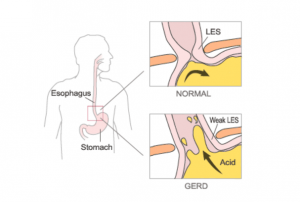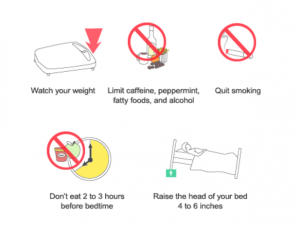Reflux Disease (Heartburn)
What Is Gastroesophageal Reflux Disease (GERD)?

Gastroesophageal reflux is a physical condition in which acid from the stomach flows backward up into the esophagus. People can experience heartburn when excessive amounts of acid reflux into the esophagus. Most people will experience heartburn if the lining of the esophagus comes in contact with too much stomach juice for too long a period of time. This stomach juice consists of acid, digestive enzymes, and other injurious materials. The prolonged contact of acidic stomach juice with the esophageal lining injures the esophagus and produces a burning discomfort. Normally, a muscular valve at the lower end of the esophagus called the lower esophageal sphincter (LES) keeps the acid in the stomach and out of the esophagus. In gastroesophageal reflux disease, the LES relaxes too frequently, which allows stomach acid to reflux, or flow backward into the esophagus.
What Are The Causes of Acid Reflux?
Heartburn is normally caused by lifestyle choices and what you put into your body. More specifically….
- Eating large meals or lying down right after a meal
- Being overweight or obese
- Eating a heavy meal and lying on your back or bending over at the waist
- Snacking close to bedtime
- Eating certain foods, such as citrus, tomato, chocolate, mint, garlic, onions, or spicy or fatty foods
What Are The Signs And Symptoms Of Reflux Disease?
Many describe heartburn as a burning discomfort, localized behind the breastbone that moves up toward the neck and throat. Some even experience the bitter or sour taste of the acid in the back of the throat or mouth. The burning and pressure symptoms of heartburn can last for several hours and often worsen after eating food. Occasional heartburn is very common. However, frequent heartburn, (two or more times a week), difficulty swallowing or weight loss may be associated with a more severe problem known as gastroesophageal reflux disease.
What Are The Risk Factors Of Heartburn?
The potential risk factors of acid reflux disease are those caused by life choices and other factors…
- Drinking certain beverages, such as alcohol, carbonated drinks, coffee, or tea
- Smoking
- Being pregnant
- Taking aspirin, ibuprofen, certain muscle relaxers, or blood pressure medications
Tests To Evaluate For Acid Reflux Disease
Upper Endoscopy: This test involves passing a thin flexible tube through the mouth into the esophagus, stomach and the beginning of the small bowel to examine for abnormalities. The tube has a light and a camera at the tip and the lining of the digestive tract is directly visualized. The test is performed using sedation. It is the best test to identify injury (erosions and ulcers) in the upper GI tract and Barrett’s esophagus.
Upper GI Series: This test involves drinking a liquid barium mixture. The radiologist uses a fluoroscope to watch the barium as it travels down the esophagus and into the stomach. The patient is asked to move into various positions on the X-ray table while the radiologist watches the GI tract and takes X-rays.
Esophageal Manometry or esophageal PH: Esophageal manometry involves passing a small flexible tube through the nose into the esophagus and stomach in order to measure pressures and function of the esophagus. The acid level in the esophagus can be measured over a 48-hour period by attaching a capsule to the lining of the esophagus.
Extra-Esophageal Manifestations (EEM): GERD can masquerade as other diseases. Increasingly, we are becoming aware that the irritation and damage to the esophagus from continual presence of acid can prompt an entire array of symptoms other than simple heartburn. The role of acid reflux has been overlooked as a potential factor in the diagnosis and treatment of patients with chronic cough, hoarseness and asthma-like symptoms. In some instances, patients have never reported heartburn.
Are There Preventative Steps or Measures To Avoid Acid Reflux?
In order to decrease the number of gastric contents that reach the lower esophagus, certain simple guidelines should be followed through lifestyle and dietary modifications:

Eat small frequent meals rather than fewer large meals.
What Are The Potential Risks If Reflux Disease Is Left Untreated?
Peptic Stricture
This results from chronic acid injury and scarring of the lower esophagus. Patients complain of food sticking in the lower esophagus.
Barrett’s Esophagus
A serious complication of chronic GERD is Barrett’s esophagus. The lining of the esophagus, in patients with Barrett’s esophagus, has changed to resemble the stomach lining. As a result, patients may complain of less heartburn with Barrett’s esophagus. Unfortunately, this is a pre-cancerous condition: patients with Barrett’s esophagus have approximately a 30-fold increased risk of developing esophageal cancer. These patients should be followed by endoscopy.
Esophageal Cancer
If GERD is left untreated for many years, it could lead to this most serious complication – Barrett’s esophagus and esophageal cancer. In patients with chronic heartburn, an endoscopy will often be recommended to visually monitor the condition of the lining of the esophagus and identify or confirm the absence of any suspicious or pre-malignant lesions, such as Barrett’s esophagus. The preventative strategy is to treat heartburn. The survival rate for esophageal cancer, at this time, is dismal.
Are There Treatment Options To Heartburn?
Medical Treatment
Acid Reflux Disease has a physical cause and frequently is not curtailed by these lifestyle factors alone. If you are using over-the-counter medications two or more times a week, your doctor may recommend evaluation for GERD and prescribe medications that reduce acid production, increase LES tone, or improve gastric emptying.
Surgical Treatment
Surgical measures to prevent reflux can be considered if other measures fail or complications occur such as bleeding, recurrent stricture, or Barrett’s esophagus (abnormal transformation of cells lining the esophagus). The surgical technique improves the natural barrier between the stomach and the esophagus that prevents acid reflux from occurring. Consultation with both a gastroenterologist and a surgeon is recommended prior to such a decision. There are always new treatments and possibilities looming on the horizon.



